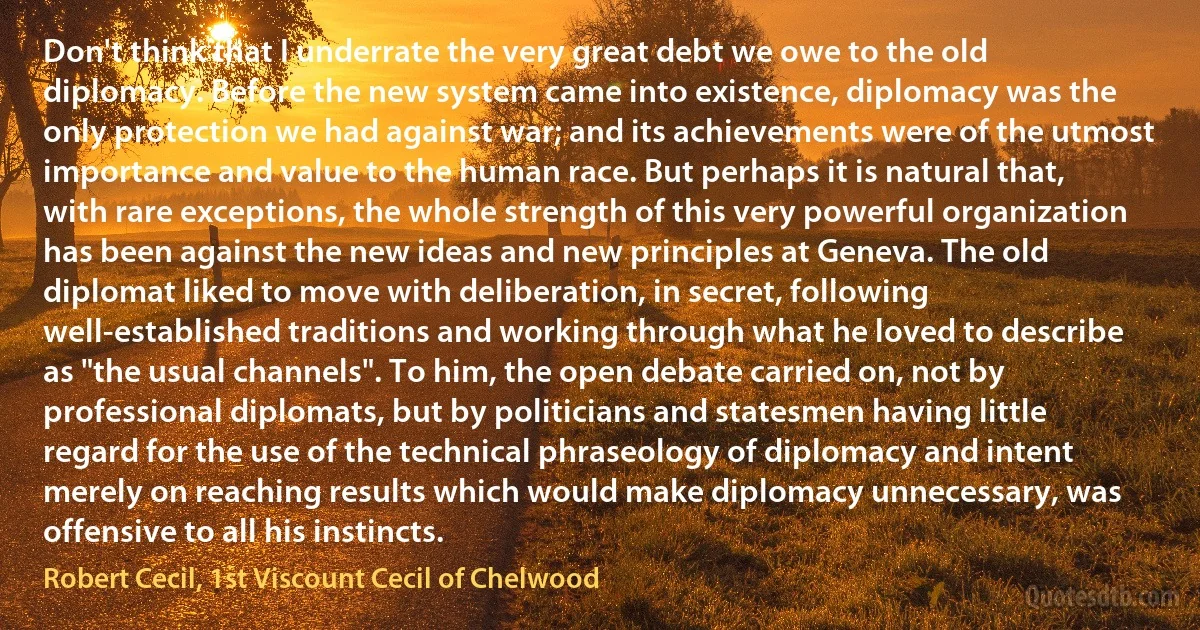
Don't think that I underrate the very great debt we owe to the old diplomacy. Before the new system came into existence, diplomacy was the only protection we had against war; and its achievements were of the utmost importance and value to the human race. But perhaps it is natural that, with rare exceptions, the whole strength of this very powerful organization has been against the new ideas and new principles at Geneva. The old diplomat liked to move with deliberation, in secret, following well-established traditions and working through what he loved to describe as "the usual channels". To him, the open debate carried on, not by professional diplomats, but by politicians and statesmen having little regard for the use of the technical phraseology of diplomacy and intent merely on reaching results which would make diplomacy unnecessary, was offensive to all his instincts.
Robert Cecil, 1st Viscount Cecil of ChelwoodRelated topics
came carry debate debt following geneva great having human move natural open organization perhaps phraseology professional race secret strength technical think use utmost value war working channelsRelated quotes
Some scoffers have asked, "Where are the pre-Flood civilizations? If there was an entire civilization that was destroyed in the Flood of Noah, why don't we find their cities, highways or machines as we dig in the earth?” That's a fair question, but it is based on a false premise. What type of stuff would they need in a perfect world? If the weather was perfect and the animals were friendly and food was abundant and free and everyone was vegetarian, what would they need? They wouldn't need houses to be protected from weather, climate, or animals. I don't see why they would need buildings of any kind! If the earth was producing enormous quantities of food from pole to pole, they wouldn't need tractors, plows nor a highway system, nor vehicles to move food and goods from one region to another. They wouldn't need lots of things we need for survival and protection today.

Kent Hovind
I told him how we kept fewer forms between us and God; retaining, indeed, no more than, perhaps, the nature of mankind in the mass rendered necessary for due observance. I told him I could not look on flowers and tinsel, on wax- lights and embroidery, at such times and under such circumstances as should be devoted to lifting the secret vision to Him whose home is Infinity, and His being - Eternity. That when I thought of sin and sorrow, of earthly corruption, mortal depravity, weighty temporal woe - I could not care for chanting priests or mumming officials; that when the pains of existence and the terrors of dissolution pressed before me - when the mighty hope and measureless doubt of the future arose in view - _then_, even the scientific strain, or the prayer in a language learned and dead, harassed: with hindrance a heart which only longed to cry - "God be merciful to me, a sinner!"

Charlotte Brontë
Or indeed we may say again, it is in what I called Portrait-painting, delineating of men and things, especially of men, that Shakspeare is great. All the greatness of the man comes out decisively here. It is unexampled, I think, that calm creative perspicacity of Shakspeare. The thing he looks at reveals not this or that face of it, but its inmost heart and generic secret: it dissolves itself as in light before him, so that he discerns the perfect structure of it. Creative, we said: poetic creation, what is this too but seeing the thing sufficiently? The word that will describe the thing, follows of itself from such clear intense sight of the thing. And is not Shakspeare's morality, his valour, candour, tolerance, truthfulness; his whole victorious strength and greatness, which can triumph over such obstructions, visible there too? Great as the world!

Thomas Carlyle
Just as economic pressure from the base ... is able to modify the production of surplus value, so pressure grounded in spatial practice is alone capable of modifying the apportionment of that surplus value - i. e. the distribution of the portion of social surplus production allotted to society's collective 'interests', to so-called social services. Such grass-roots pressure, if it is to be effective in this regard, cannot be confined to attacking the state qua guardian of the 'general interest'. For this state, born of the hegemony of a class, has as one of its functions - and a more and more significant function - the organization of space, the regularization of its flows, the control of its networks. It devotes to these purposes a considerable part of global surplus value, of the surplus production assigned to the running of society.

Henri Lefebvre
It is impossible to answer your question briefly; and I am not sure that I could do so, even if I wrote at some length. But I may say that the impossibility of conceiving that this grand and wondrous universe, with our conscious selves, arose through chance, seems to me the chief argument for the existence of God; but whether this is an argument of real value, I have never been able to decide. I am aware that if we admit a first cause, the mind still craves to know whence it came, and how it arose. Nor can I overlook the difficulty from the immense amount of suffering through the world. I am, also, induced to defer to a certain extent to the judgment of the many able men who have fully believed in God; but here again I see how poor an argument this is. The safest conclusion seems to me that the whole subject is beyond the scope of man's intellect; but man can do his duty.

Charles Darwin
